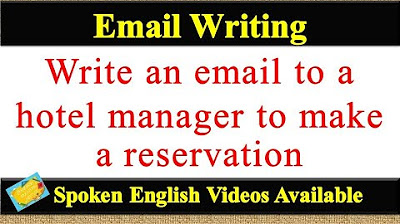Better Your Storytelling - 5 Quick Tips
Summary
TLDRIn this enlightening video, the host shares valuable insights on enhancing storytelling skills in filmmaking, straight from a hotel room in LA while wrapping up a feature-length film. Sponsored by Professional Photographers of America, the video presents five pivotal tips: starting with the ending to guide the narrative, the power of showing over telling, the importance of a central question driving the film, exploring characters' deeper emotional quests beyond their physical goals, and the compelling nature of underdog stories. Additionally, the host emphasizes the significance of concise storytelling, highlighting that brevity can often lead to a stronger impact.
Takeaways
- 🎥 Storytelling is foundational to good filmmaking, with the video aiming to offer fresh, actionable tips.
- 💻 The video is sponsored by the Professional Photographers of America, emphasizing the importance of community and professional resources for photographers.
- ✅ Finding the ending first is crucial for storytelling, allowing filmmakers to create a cohesive narrative that leads purposefully to a strong conclusion.
- 📽 Showing rather than telling is emphasized, urging filmmakers to create more engaging and immersive experiences by letting the audience see events unfold.
- ❓ Incorporating a central question in the film is vital, as it drives the narrative forward and introduces tension and conflict.
- 🚗 The use of a Tesla for transportation hints at modern filmmaking practices and the lifestyle of the filmmaker.
- 💼 PPA membership benefits, including equipment insurance and business resources, highlight the practical aspects of filmmaking and photography.
- 📚 The dual quest concept, involving both a physical and an emotional journey, is highlighted as a key storytelling technique.
- 🐾 The inclusion of a pet assistant editor adds a personal touch and relatability to the filmmaking process.
- 👥 Emphasizing underdog stories is recommended for creating compelling narratives that audiences can root for.
- ⏱️ Brevity in storytelling is advised, stressing that longer does not necessarily mean better and that focus should be on what's most impactful.
Q & A
Why does the video creator emphasize finding the ending of the story first?
-The creator emphasizes finding the ending first to ensure the story progresses naturally towards a strong conclusion, making the entire narrative feel cohesive and directed towards that ending, rather than meandering aimlessly.
What is the significance of showing rather than telling in filmmaking, according to the script?
-Showing rather than telling is significant because it allows the audience to experience moments directly, making the story more interesting and engaging by visualizing experiences and emotions instead of merely describing them.
What is the role of a central question in a film's narrative?
-A central question creates tension and conflict by setting a goal or challenge the film seeks to address or answer throughout its narrative, providing direction and purpose to the story.
How does the video creator view the ending of a film in terms of storytelling?
-The creator views the ending as the most crucial part of a film, advising that it should be the strongest part and receive significant attention during the storytelling process to ensure a satisfying and impactful conclusion.
What benefits does the Professional Photographers of America (PPA) offer to its members, as mentioned in the video?
-PPA offers benefits such as equipment insurance, data recovery services, and business resources including contracts, copyright transfers, and model releases to help photographers manage their businesses more effectively.
How does the creator suggest handling stories about past events in documentaries?
-The creator suggests recreating past events rather than just having subjects talk about them, to allow the audience to relive these moments and better connect with the experiences and emotions being conveyed.
What are the two types of quests mentioned in the script and their significance?
-The script mentions physical and emotional/metaphysical quests. The physical quest is what the characters overtly seek to achieve, while the emotional quest delves into deeper desires and motivations, adding depth to the narrative.
Why is it important for characters to have flaws or challenges, according to the video?
-Characters with flaws or challenges are more interesting and relatable. They allow the audience to root for the underdog, creating a more engaging and emotionally resonant story.
What is the creator's advice regarding the length of a film?
-The creator advises that longer isn't necessarily better and emphasizes the importance of concise storytelling. Effective storytelling often involves cutting unnecessary parts to keep the narrative focused and engaging.
How does the creator relate their editing process to their budget constraints?
-The creator mentions editing out of their editor's living or dining room due to budget constraints, highlighting the challenges of working within financial limits while still striving to complete the film effectively.
Outlines

This section is available to paid users only. Please upgrade to access this part.
Upgrade NowMindmap

This section is available to paid users only. Please upgrade to access this part.
Upgrade NowKeywords

This section is available to paid users only. Please upgrade to access this part.
Upgrade NowHighlights

This section is available to paid users only. Please upgrade to access this part.
Upgrade NowTranscripts

This section is available to paid users only. Please upgrade to access this part.
Upgrade NowBrowse More Related Video

Geliat Sinema Indonesia Timur dan Film Basri-Salma yang Keliling Dunia

At the Hotel - Useful Learn English Lesson for Real Life

Farah Quinn - Guidelines Untuk Hotel Buffet Etiquettes

Why the EDITING of WHIPLASH is PERFECT

Prototype & Test in 10 minutes or less

Write an email to a hotel manager to make a reservation | hotel manager to make a reservation email
5.0 / 5 (0 votes)